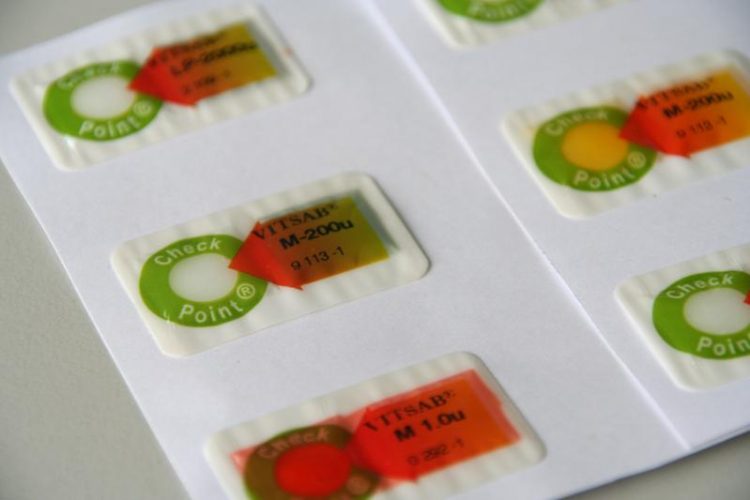Intelligent label for better food

TTI based on an enzymatic reaction inform the consumer about the quality of the products using a green-orange-redlight system. Picture: ttz Bremerhaven
Controlling the post production life cycle of food is an important element of food supply chains. Improper handling of product during transport, storage and in households results in quality defects, increases risk of microbial growth, subsequent spoilage and increases wasting of food.
Previous investigations showed that there are still many unexploited application areas for time-temperature monitoring using smart labels. In the IQ-FRESHLABEL project, novel intelligent labels for indication of temperature abuse of frozen foods were developped.
These smart labels have to meet demands specific to frozen food. Products have very long shelf-life of 18 to 24 months at optimal storage temperature of -18°C. Increase of temperature lead to major quality deterioration, even if temperature stays below 0°C.
“Smart labels for frozen fish products are validated in Greek cold chain and ready to be implemented on the market. It is possible on a unit base to monitor the quality of the food products in terms of respect of the optimal storage temperature along the cold chain – an obvious benefit for the consumer”, says Marie Shrestha, project manager at the independent research institute ttz Bremerhaven.
Leakages in chilled poultry products packed under modified atmosphere lead to change of the gas atmosphere and thus the shelf life of a product is decreased by 26% for example for a leakage with 0.2mm diameter. A novel, cheap and non-destructive quantitative oxygen detection system, using luminescence technology was created to detect leakages in MAP food (detection range 0-30% O2) and inform about subsequent potential premature spoilage of the food product.
The socio-economical impact of the integration of the smart labels in different food chains was studied in Finland, Germany, Southern France, and Greece. Food manufacturers, retailers and consumers see benefit in implementing intelligent labels. Consumers consider that products with TTI are of higher quality than the ones without and are willing to pay 20 cents more for TTIs (n=2525 consumers interviewed).
Participating food, packaging and consumer associations promoted the influence of smart labels application on waste reduction, food quality and safety in the European supply chains in Greece, Finland, Norway, France, Romania and Poland. Consumers considered that TTIs would assist them to handle food products in adequate manner (n=2525).
IQ-FRESHLABEL is a research project, partly funded by the European Commission in the 7th Framework programme. The project was running for three and a half years (1st August 2010 to 31st January 2014) with 17 partners from 9 different countries.
ttz Bremerhaven is an independent research institute and performs application-related research and development. Under the umbrella of ttz Bremerhaven, an international team of experts is working in the fields of food, environment and health. ttz has assisted enterprises of all sizes for over 25 years in the planning and implementation of innovation projects and the corresponding acquisition of funding at national and European level. http://www.ttz-bremerhaven.de
Media Contact:
Christian Colmer
Head Communications
ttz Bremerhaven
Fischkai 1
D-27572 Bremerhaven (Germany)
Tel.: +49 (0)471 80934 903
Fax: +49 (0)471 4832 129
ccolmer@ttz-bremerhaven.de
http://www.ttz-bremerhaven.de
http://www.facebook.com/ttzBremerhaven
http://www.twitter.com/ttzBremerhaven
http://www.xing.com/companies/ttzbremerhaven
Media Contact
All latest news from the category: Health and Medicine
This subject area encompasses research and studies in the field of human medicine.
Among the wide-ranging list of topics covered here are anesthesiology, anatomy, surgery, human genetics, hygiene and environmental medicine, internal medicine, neurology, pharmacology, physiology, urology and dental medicine.
Newest articles

Detector for continuously monitoring toxic gases
The material could be made as a thin coating to analyze air quality in industrial or home settings over time. Most systems used to detect toxic gases in industrial or…

On the way for an active agent against hepatitis E
In order to infect an organ, viruses need the help of the host cells. “An effective approach is therefore to identify targets in the host that can be manipulated by…

A second chance for new antibiotic agent
Significant attempts 20 years ago… The study focused on the protein peptide deformylase (PDF). Involved in protein maturation processes in cells, PDF is essential for the survival of bacteria. However,…





















